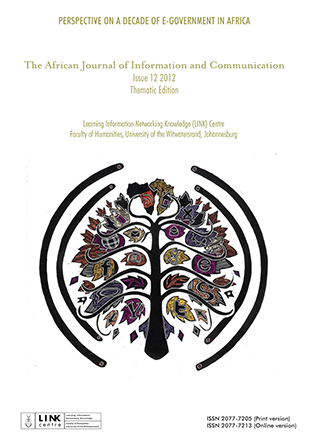e-Government and the Cameroon Cybersecurity Legislation 2010: Opportunities and Challenges
Keywords:
Cameroon e-laws 2010, e-government in Cameroon, cybersecurityAbstract
The EGOV.CM programme, led by the National Agency for ICT (ANTIC) aims to promote access to government information and services, provide IT support to the public administration reform programme, promote the objectives of national policies and provide an appropriate legal and regulatory environment. However, government and citizen reliance on ICTs presents a security challenge, given the emergence of cybercrime across the globe. This requires changes tolegislation drafted before the electronic age. Outdated laws result in impunity, with the country a safe haven for cybercriminals, while e-government transactions may be unprotected and may therefore be discouraged. Cameroon's e-laws of 2010 (cybersecurity and electronic communications) provide a legal framework for the protection of ICT networks and critical infrastructures, creating an enabling environment for e-government services. These research notes highlight the importance of the e-laws for effective Cameroonian public administration, and discuss the challenges for implementation of e-government
References
Akuta, E., Ong’oa, I. & Jones, C. (2011). Combating cyber crime in sub-Sahara Africa: A discourse on law, policy and practice. Journal of Peace, Gender and Development Studies, 1(4), pp. 129-137, retrieved 12 June 2012 from http://www.interesjournals.org/JPGDS/pdf/2011/May/Akuta%20et%20al.pdf.
Asongwe, P. (2011). Cameroon’s public administration since 1998: Tracking the opportunities and challenges of digital governance. Paper presented at the Fifth eGov Africa Forum, 26-28 April 2011, Yaounde.
Asongwe, P. (2010). A model regulatory and legislative framework for Cameroon. Presentation to the 1st CTO Cybersecurity Conference, 16-18 June 2010, London.
Kamga, A. (2011). e-Government: The way to ... Cameroon. Paper presented at the eGov Africa Forum, 26-28 April 2011, Yaounde.
Mokube, P. (2010). State of e-governance in Cameroon. Presentation at Seminar on Electronic Governance Cameroon, July 2010, Yaounde.
Pollifroni, M. (2006). Cyber crimes and egovernment applications: some empirical evidences. eGovernment Workshop ’06 (eGOV06), 11 September 2006, Brunel University, West London.
Republic of Cameroon (2010a). Law No 2010/012 of 21 December 2010 relating to cybersecurity and cybercriminality in Cameroon, Republic of Cameroon, Yaounde.
Republic of Cameroon (2010b). Law No 2010/013 of 21 December 2010 relating to electronic communications in Cameroon, Republic of Cameroon, Yaounde.
Schechter, S. (2004). Computer security strength and risk: A quantitative approach. PhD thesis, Harvard University.
Downloads
Published
Issue
Section
License
Copyright (c) 2012 https://creativecommons.org/licenses/by/4.0

This work is licensed under a Creative Commons Attribution 4.0 International License.
How to Cite
- Abstract 300
- pdf 180


.png)